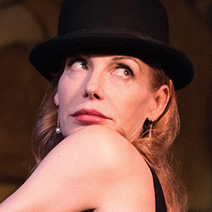Ute Lemper
Rendezvous with Marlene
Café Carlyle, NYC, February 27, 2018
Reviewed by Elizabeth Ahlfors for Cabaret Scenes

Photo: David Andrako
Dressed in tuxedo black, Ute Lemper returned to the Café Carlyle for a Rendezvous with Marlene. That’s Marlene Dietrich, of course, the exemplar of the world-weary Teutonic temptress that Lemper today personifies with her bold brooding voice and imposing demeanor. She commands the stage with grace and authority, performs the songs that Dietrich sang, and tells the stories that define the timeless film and cabaret star.
An international chanteuse, the red-haired Lemper enjoys a varied 30-plus-year career in theater, cabaret, films, and recordings. A multi-linguist, she is acclaimed for her interpretations of European songs and the music of Jacques Brel, Kurt Weill and Berthold Brecht, as well as Léo Ferré, Edith Piaf, Jacques Prévert and Argentina’s master of the tango, Astor Piazzolla. She has appeared on Broadway, Paris and West End stages in major musicals like Chicago and Cabaret, and bases her Marlene show on a telephone call she had with Dietrich 30 years ago. Dietrich, then elderly and a recluse in Paris, talked with Lemper for three hours about her life and career, and now Lemper decided to perform her homage to Marlene Dietrich on stage.
In a low, quick, murmuring tone that suddenly leaps up in volume, Lemper told the story of that telephone talk and delivered some of the signature film songs, like “The Boys in the Backroom” (Frank Loesser/Friedrich Hollaender) from The Blue Angel. Years later, in Stage Fright, Dietrich sang Cole Porter’s playfully sexy “The Laziest Gal in Town.”
Dietrich never wanted to return to the country of her birth after World War II, claiming, “My soul belongs to France. My heart belongs to England. Nothing belongs to Germany except my body when I’m dead.” She was buried in Berlin next to her mother. Selections reflecting Germany during the war include her bittersweet nostalgia of “Lili Marleen” (Hans Leip/Norbert Schultze), a wartime classic among the soldiers on both sides, even when recorded in German. She included Hollaender’s “The Ruins of Berlin” and selling illusions in “Black Market.” Johnny Mercer’s English lyrics to “When the World Was Young” (“Ah, the Apple Trees”) elucidated the past in the song originated by M.
Philippe-Gérard with French lyrics by Angèle Vannier.
Always anti-war, Dietrich supported the 1960s war protests, with Lemper recalling the era with Pete Seeger’s “Where Have All the Flowers Gone?” and Bob Dylan’s “Blowin’ in the Wind.” Honoring Dietrich’s close friend, Edith Piaf, Lemper delivered, “Que reste-t-il de nos amours?” by Léo Chauliac and Charles Trenet. She followed with the English translation, “I Wish You Love” (lyrics by Albert Askew Beach), dedicated to Dietrich’s estranged daughter, Maria Riva, who had betrayed her.
Accompanying Lemper in this cosmopolitan showpiece is music director/pianist Vana Gierig, bassist Romain Lecuyer, and Cyril Garac on violin.





